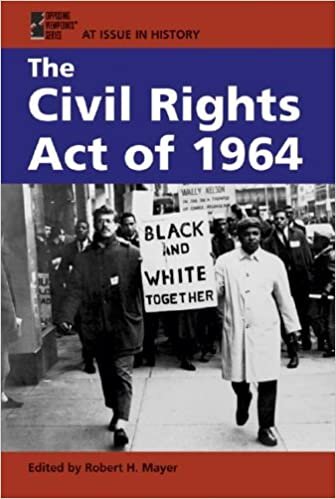PRAISE FOR THE CIVIL RIGHTS ACT OF 1964
“An absorbing collection of primary- and secondary-source material on this landmark legislation.” School Library Journal
“The content will stimulate rich classroom discussions on the topic of civil rights and will illustrate to students that historical events can be interpreted in many ways.” Social Education
Award: Carter G. Woodson Secondary Winner For 2005-National Council for the Social Studies
ABOUT THE CIVIL RIGHTS ACT OF 1964 (AT ISSUE IN HISTORY) (2004)
When the people at Greenhaven Press asked me to edit a book on the Civil Rights Act of 1964, I rushed over to the Lehigh University Library to find the Congressional Record and read the words of legislators arguing over the proposed civil rights legislation. Studying that arguing made sense since my task was to find primary documents that captured various sides of the conflict. Though I did that research a while ago, I still recall my shock at the way our leaders talked about race, ways we would call racist today.
I quickly realized that by sticking with Congress, I would not reach one of my goals, to include black voices. At the time, there were only a few black representatives and no black senators. I moved beyond Congressional Record.
By looking for those black voices, I discovered something amazing. In 1963 at the March on Washington, John Lewis planned to give a talk that was so controversial, movement leaders pushed him to change what he planned to say. Mr. Lewis spoke out against the civil rights act being discussed in Congress, calling it “too little and too late.” I included his original speech in the book. (Today John Lewis is a representative from Georgia.)
I also found that Dr. King wrote what I would call an African-American state-of-the-union piece in Nation magazine every year. His comments on the Civil Rights Act from 1964 and 1965 are included in the book.
There was one big mistake. I did not include an important speech given by Malcolm X called “The Ballot or the Bullet.” In that speech, Malcolm X shares his feelings about the proposed civil rights act and the entire civil rights movement. A re-write would include that speech, but you can hear Malcolm X deliver that speech yourself: https://www.youtube.com/watch?v=7oVW3HfzXkg.
The book does contain many other competing viewpoints.
The book presents the debate taking place in 1963 and 1964. I love when history is told in this manner. We need to see the dispute and the fighting that led to the world we currently live in. Seeing the blood on the pages makes history come alive.

